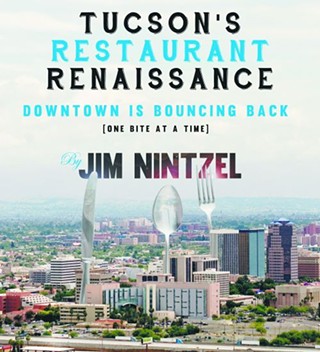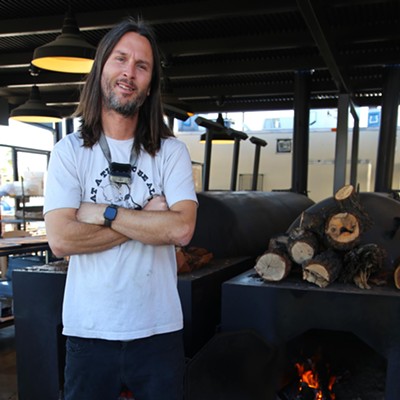Chris Bianco is a superstar in the artisan pizza biz.
Hungry fans will line up for hours outside his Pizzeria Bianco in downtown Phoenix's Heritage Square for the chance to eat one of his pies. He's the first pizza chef to bring home a James Beard award. His pizza has been celebrated in the pages of The New York Times, Gourmet, GQ, Vogue and others. He's been praised by the likes of Martha Stewart, Rachael Ray, Andrew Zimmern and Oprah. He's turned down offers to open pizzerias in New York, Chicago, Las Vegas—you name it.
Last month, he announced he'd be opening a Bianco Pizzeria on Tucson's Congress Street.
"Maybe some other places would have been sexier to do in some other people's minds, but Tucson felt like home," says Bianco, who hopes to be serving pies in downtown by November.
It helps that Bianco has friends who own wineries in Southern Arizona. He digs hanging out in Tubac. He likes the feel of history in places like Hotel Congress. He loves the band Calexico.
And now he's fallen in love with the ancient red-brick walls in a space on Congress Street between the Hub restaurant and its sister nightclub, Playground.
"I walked in the space and saw the red brick and the good neighbors and learned some of the history of that space," he says. "The more I heard about the whole scene and the people involved and what was happening, the more I wanted to make the commitment. It really felt right."
Bianco's impending move to Tucson has delighted the godfather of Sonoran farm to table, Janos Wilder, who returned to downtown after a 12-year absence when he opened Downtown Kitchen + Cocktails in 2010.
"I think we have a lot of really good restaurants coming down here, but he's the one I'm most excited about," Wilder says. "His name and reputation is going to focus a lot of attention on downtown and bring a lot people down here and be good for all of us."
Wilder isn't worried about an oversaturation of restaurants downtown, although he anticipates it will take awhile for the area to reach an equilibrium.
"We are creating a destination downtown and it will become the fine dining area of Tucson," Wilder says. "Overall, that's going to be a good thing. It'll take a little time for everything to work."
The two latest arrivals on the downtown dining scene opened last week in downtown's Rialto Building: Proper and Diablo Burger.
The two eateries have a few things in common: Both have sister restaurants in Flagstaff; both are focused on farm-to-table fare; and both have owners who stress the importance of the local community.
Paul Moir, who runs Proper with his wife, Laura, also operates Brix and Criollo in downtown Flagstaff. Brix is upscale farm to table; Criollo is a sleek Latin cafe with a similar focus on local sourcing. The Moirs find their meats, vegetables and dairy products at farms and ranches between Southern Arizona and Colorado's High Wire Ranch.
"It really helps build and support the local community that you operate in, creating a local food economy, so that more of the money that is spent in the local community stays in the local community," Moir says. "Beyond that, it's a much shorter time from farm to table, so we think the quality of the food is a lot better."
Moir, who attended the UA in the 1990s, says he didn't really expect to open a restaurant in downtown Tucson when he came down to take a look at the space in the Rialto Building, but when he saw what was happening downtown, "it blew me away."
"My jaw kind of dropped when I took a tour," Moir says. "I was hooked."
Moir describes his cuisine as "contemporary American, which gives you the license to do whatever you want, because contemporary American has Asian influences, it has Latin influences. It's all over the board. When people ask me what kind of food we're serving, I say it's proper food. That's where the name comes from."
While there are entrées such as sweet pea risotto or pan-roasted chicken breast paired with white bean and quinoa cakes and arugula, diners will also find a focus on smaller plates such as curried lamb stew, ricotta gnocchi or Welsh rarebit mac and cheese.
"You can dine around the whole menu," Moir says. "There are small plates, there are big plates, there are shared plates, there are vegetables. So you're going to be able to pick two or three different things and choose your own experience."
Just a few doors down at Diablo Burger, the menu is a lot simpler: Burgers, veggie burgers, fries (with a dash of herbs de Provence), a house salad and a grilled cheese sandwich.
The secret lies in the beef: It comes from the Flying M and Bar T Bar ranches, which make up Northern Arizona's Diablo Trust.
Diablo Burger owner Derrick Widmark used to be executive director of the trust. In the course of his work, Widmark met Gary Paul Nabhan, who formed the Native Seeds/SEARCH seed bank nonprofit in Tucson back in the early 1980s. After talking with Nabhan about locally sourced foods, Widmark was inspired to open a burger joint that would serve meat from the Diablo Trust ranches. When Diablo Burger opened in Flagstaff in 2009, it earned rave reviews and loyal customers.
Widmark had been considering opening a new restaurant in the Phoenix area, but was struggling to find the right location. After Moir told him about Tucson's Rialto Building, he decided to check it out—and realized he'd be working in a historic building next door to the Rialto Theatre and across the street from Hotel Congress. The chance to be part of a rebounding downtown was too good to pass up.
"There is something special going on here," Widmark says. "The sense of right time, right place was truly palpable."
Widmark says he wants "to be as true to place here as we are up in Flag. There was never any question of simply parachuting something in from Flagstaff. That's not how we do things and not what we stand for."
Bianco says having people like Widmark and the Moirs was a big draw for him when he was deciding whether to open in Tucson.
"Diablo Burger is delicious and I love it," Bianco says, "but the thing I like most about it is Derrick's integrity. He's a great person. He'll do great in that community."
The new restaurants have plenty of company downtown. Despite the ongoing construction—including the modern streetcar tracks, a 700-resident student housing complex next to the Rialto Building, a new Pima County courthouse at Stone and Toole, and a commercial and residential building at Stone and Broadway—downtown's restaurant scene is booming.
In early March, Patricia Schwabe, a real estate agent and developer who is also the proprietor of Tooley's Tacos in the Lost Barrio, opened Penca within the exposed brick walls of the restored Providence Services building at Broadway and Scott Avenue. Hub Ice Creamery and Eatery is a tough spot to get a table without a reservation on a weekend night—and often on weeknights as well; its sister nightclub, Playground, is jammed on weekend nights. The long-shuttered Reilly Funeral Home on Pennington Street has been transformed into Reilly's Pizza, offering wood-fired artisan pies, gourmet salads and sandwiches, and cocktails in a sleek, modern environment. Bentley's Coffee and Tea's Joanne Schneider has breathed new life into La Cocina in the gorgeous courtyard of Old Town Artisans. Thunder Canyon Brewery, long located at the Foothills Mall, opened a second spot on Broadway near Fourth Avenue. Richard and Shana Oseran of Hotel Congress branched out across the street to open Maynards in the historic train station. Café a la C'Art does a brisk breakfast and lunch business in Janos' old haunts in the Hiram Stevens House in the Tucson Museum of Art block. Ethnic food lovers can find sushi at On a Roll, Asian at Villa Thai and Ethiopian at Café Desta.
There's more on the horizon. An upscale butcher will open in the Rialto Building in the fall along with Good Oak, a bar that will serve only Arizona beers and wines. Tempe's Cartel Coffee, which already has a Campbell Avenue location, plans to open a cafe on Broadway. Developer Jim Campbell will be leasing space to a World of Beer mega-bar in the first floor of the private student-housing complex just east of the Rialto. And the old Sharks nightclub space at Congress Street and Arizona Avenue will soon be home to Saint House, a new project from Travis Reese and Nicole Flowers.
Reese and Flowers already run 47 Scott and its sister speakeasy, Scott and Co., which features infused liquors and specialty cocktails. Since opening in 2010, they have been lavished with good press. The New York Times praised Scott and Co.'s "strange and wonderful concoctions," while Food and Wine called the tiny lounge "an elite NYC bar in the middle of Arizona." In just the past few weeks, 47 Scott's grilled cheese sandwich was named one of the best in the nation by Esquire's Eat Like a Man blog, which celebrated the "leaning tower of gooeyness made using a trifecta of cheeses—yellow cheddar, fontina, and house-made mozzarella—pressed together between toasted sourdough bread kissed with garlic oil."
Saint House, which is scheduled to open in August, will feature food from across the Caribbean and anywhere else rum is produced. Reese and Flowers started out with the idea of Cuban food, but then thought they should expand their palate.
"Cuban food by itself is a little bit limiting, but there's diverse cuisine all throughout the Caribbean," Reese says. "You have French influences and African influences and Spanish influences."
Despite all the construction downtown, Reese says "the last 12 months have been totally nuts for us. People who haven't been in downtown in 10 years are coming downtown all the time now. People love this idea, whether they're eating at Reilly and getting a cocktail from us and getting ice cream at Hub—I think that all of that works."
Reese credits several factors, including the spillover from shows at the Rialto and Fox theaters—"it seems like the Rialto has something amazing every week now," he says—and from people who can't get a seat at Hub, which has been another one of downtown Tucson's success stories.
"Hub opening created this critical mass of people that had to seek out other options," Reese says.
Under the command of owners Kade Mislinski and Jenny Rice, Hub Ice Creamery and Eatery was a hit as soon as it opened in 2011. If you don't have a reservation on a weekend night in season, you're in for a long wait for a table.
Hub features a wide range of comfort food—house-made pastrami and corned beef, elaborate salads, rich mac and cheese and the like—paired with an ever-changing lineup of house-made ice cream. (Flavors range from standard chocolate and vanilla to rocky-road variants called asphalt and caliche in honor of the streetcar construction along Congress.)
But a big part of the experience relies on the ambience. It has a sleek, upscale vibe anchored by red-brick walls that date back nearly a century.
Restoring those walls at Hub—as well as at Playground, a nightclub also owned by Mislinski a few doors down at the corner of Congress and Fifth Avenue—was no easy task. They were so old that they could no longer be counted on to hold the building up; instead, 18 steel columns had to be driven 14 feet into the ground to create a new support structure.
"It was a massive expense of steel to ensure that the beautiful brick—which is now aesthetic—will be there for decades," says developer Scott Stiteler, who's made a considerable investment to keep the historic feel of the buildings.
Stiteler owns or co-owns the south side of Congress Street from Herbert Avenue to Arizona Avenue (with the exception of the Rialto Theatre, which is owned by the Rio Nuevo Board and leased to the nonprofit Rialto Theatre Foundation). He also owns the block between Hotel Congress and the Ronstadt Transit Center on the north side of the street.
His first major project was building the new MLK apartments using federal funding for low-income and elderly residents. At the same time, he rehabbed the old MLK building into the One North Fifth apartments. On his regular visits to Tucson, Stiteler stays in a unit on the top floor.
Ari Shapiro, who owns Sparkroot cafe and Xoom Juice on the first floor of One North Fifth, signed Stiteler's first commercial lease in downtown. He calls Stiteler a "visionary" landlord.
"You can tell, that as a developer, he truly cares about the types of businesses and not just the bottom line," Shapiro says.
Reese, who will have Stiteler as a landlord at Saint House, says he loves the way Stiteler "invests in projects—and not just financially invests. He seems to be really emotionally connected in each storefront. And he has an overall vision, too."
Stiteler's vision for Congress Street has been a work in progress. So far, he's on a winning streak. By the end of the year, he'll be the landlord for Pizzeria Bianco, Hub, Playground, Diablo Burger, Proper, Good Oak Bar, Saint House and the yet-to-be-named butcher between the Rialto Theatre and Arizona Avenue on the south side of Congress, as well as Sparkroot and Xoom Juice on the north side.
Lately, Stiteler has been drawing inspiration from wandering San Francisco's Mission neighborhood, but he travels frequently and spends a lot of time shooting photos and taking notes. "I drive my wife and kids crazy," he says.
He wants to see Congress Street as the same kind of place where people can explore different kinds of cool and intriguing spaces. At the same time, he wants to respect the history of the buildings as he finds ways to bring them back to life. He takes delight in small details, talking about how Widmark is examining historic photos to find inspiration as he prepares to open Good Oak Bar next to his Diablo Burger.
"It's not just beer and wine," he says. "It's about respecting all that happened in this building since 1918."
That historic touch has not come cheap.
"If someone did a case study on what it takes to restore old buildings and studies all the different variables, I don't think many people would go that route," he says. "It is just enormously expensive."
Stiteler has started with restaurants like Hub, Diablo Burger, Proper and Bianco, but he wants more diversity in the future.
"Restaurants are first because restaurants are risk-takers," Stiteler says. "Retail takes awhile to evolve. Then you have residential. They build on each other."
Tucson City Councilman Steve Kozachik sees the blossoming restaurant scene as a sign that after many fits and starts, downtown revitalization is at hand.
"We're hitting some singles and doubles instead of swinging for the fences and we've got some people like Scott Stiteler and the Oserans who are doing it right," Kozachik says. "All the naysayers and people who live east of Country Club and don't care about downtown ought to pay us a visit. They'll see some good things happening."
Big changes remain on downtown's horizon. This fall, 700 students will be moving into developer Jim Campbell's Cadence development, next door to the Rialto Theatre and atop the Centro parking garage. The modern streetcar is scheduled to start running between the UA and downtown in early 2014, which will help the university move more facilities into downtown.
Michael Keith, executive director of the Downtown Tucson Partnership, estimates that at least $209 million in private dollars will have been invested in the greater downtown area (including the west bank of the Santa Cruz River) between 2008 and the end of 2013.
Keith says he's "stunned" by how quickly downtown's fortunes have turned around.
"We thought this would happen over a longer period of time," Keith says. "We were very confident that this would happen, but the way this has accelerated in the last year has been astonishing and gratifying all at the same time. Everything now is propelling everything else."
There's still a lot on Stiteler's agenda, too. While he says he's thrilled with the new restaurants that are opening on Congress Street, "I really believe we're only 35, maybe 40 percent toward this goal of having something that's very special for decades and puts downtown Tucson on the map of someplace you really want to travel to and spend time."
Stiteler's next project is Connect, a workspace he hopes to open in October on the second floor of the Rialto Building. The idea is to rent communal office space to people who are seeking a creative environment. The concept is already working in cities like New York, San Francisco and Los Angeles.
"It should be a perfect fit and complement to an entertainment area and a strong intersection that's being reanimated and has a lot of vitality," Stiteler says. "I'm as passionate about this as anything I've done."
He's also working with fellow developer Rudy Dabdoub to line up a deal for a boutique hotel on the Fifth Avenue lot across the street from Hotel Congress.
As he moves forward with his projects, Stiteler finds himself in a position where, more and more often, he's saying no to businesses that would like to be in one of his buildings. He has the luxury to do so because he's found people like the Moirs, Widmark and Bianco who have helped him aim for the best.
"Great isn't good enough," Stiteler says. "It needs to be, and can be, and should be excellent."
Bianco says that kind of attitude was a key reason for deciding to come to Tucson.
"Scott could have stayed in San Francisco and probably done something safer and lived happily ever after," Bianco says. "To want to bring people with good intentions together—that's my kind of party."























